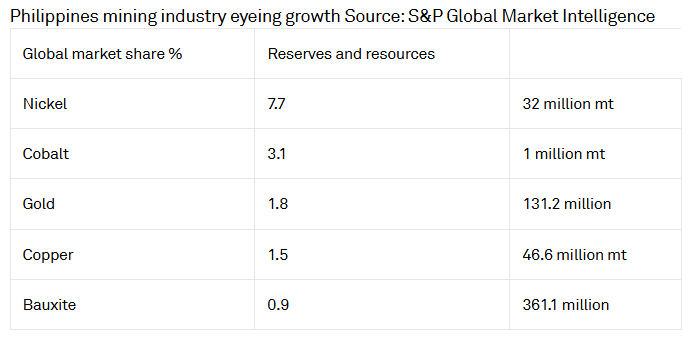COMMODITIES 2025: New law could spur Philippine nickel mining to new heights
S&P Global | December 26, 2024
This is part of the COMMODITIES 2025 series where our reporters bring to you key themes that will drive commodities markets in 2025.
Philippine President Ferdinand Marcos Jr. has big plans for the country’s already substantial nickel industry, as well as the mining industry more broadly, and he is pushing new legislation to bring that vision to life.
Marcos has been urging lawmakers to pass a reform bill that would amend the Philippine Mining Act of 1995. The proposed new system would impose a four-tier, margin-based royalty ranging from 1.5% to 5%, depending on the location of the mine. Regulators would also take into account environmental factors when permitting a new mine.
This system would be simpler than the existing one, a government statement said. Currently, fiscal obligations for miners vary depending on the specific mining agreement, and only mines in a designated mineral reservation are taxed.
“In addition to financial aspects, the renewed bill will incorporate important considerations in project approvals that were previously overlooked, such as biodiversity and the involvement of stakeholders like local government units, local communities and civil society,” said Paul Manalo, an analyst with S&P Global Commodity Insights.
The bill is awaiting passage in the Senate, where it is likely to advance given recommendations for approval from officials. The country’s miners are optimistic.
Michael Toledo, chairman of the industry trade group Chamber of Mines of the Philippines, said “the president himself mentioned to me that he is fully aware of mining’s importance to our country’s socio-economic growth and of the issues that hinder the industry from attaining its full potential.”
“And we are happy to note that our government officials are busy working on our recommendations, and look forward to their realization in the near future,” Toledo said by email.
Sustainability, innovation and the nickel value chain
Marcos, who took office in mid-2022, has been openly advocating for responsible mining for some time.
“It is imperative that we adopt mining practices that prioritize the environment, to ensure that our extraction processes are clean, efficient, and restore the land that has been mined,” he said in October during the 2023 Presidential Mineral Industry Environmental Award ceremony.
“We must also foster innovation by driving research into new methods of mineral processing. Methods that reduce waste and energy consumption,” he said. “Furthermore, we continue to refine and enhance our mining policies to reflect these priorities.”
The Philippines was the second-largest producer of mined nickel in 2024 and has 13.4 million metric tons in reserves and resources. The 387,00 metric tons it produced in 2024 trailed only Indonesia, according to S&P Global Market Intelligence data.
But Marcos and the industry want to produce more and, if possible, move up the value chain by processing the nickel domestically.
“We think that major comparative disadvantages that make big mining investments difficult, particularly in mineral processing, ought to be addressed by the government,” Toledo said. “The Philippines must collaborate and share technology with miners in South Korea, Japan and the EU in order to access alternate smelting processes.”
“Mineral extraction and processing are at the supply chain upstream in the manufacture of clean energy products and, at the moment, there’s just not enough ore being mined to feed yet-to-be-built mineral processing facilities, as investments are being driven away by disincentives in our sector,” Toledo said.
The Philippines in October launched a digital application process for mining permits in three regions and will eventually expand it nationwide, aiming to cut permitting times to two years. That month, an official with the Department of Environment and Natural Resources also said efforts were underway to draft an executive order to address some conflicting interpretations of existing mining royalty law.
The Philippines approved 785 mining-related permits in the first quarter of 2024, according to the most recent government data. Approved permits included mineral production sharing agreements, financial or technical assistance agreements, and exploration permits. As of the end of the first quarter, applications still in process totaled 1,509.
The Trump factor
Toledo said the Chamber of Mines expects the country to remain among the leading producers of gold, copper and nickel in the years ahead, given its rich reserves and the current and expected sources of demand for those metals. Nickel has been challenged by price declines this year, but Toledo said the group is optimistic about nickel’s overall prospects due to energy-transition demand, including in 2025.
One source of uncertainty is incoming US president Donald Trump, who has already threatened to upend existing US trade relationships and, with them, global metals trade flows.
“We don’t know yet how the Trump presidency will affect commodity prices, particularly those of minerals needed for clean energy. Experts, however, believe Trump’s return will only slow, but not stop, the global drive towards net-zero emissions,” Toledo said.
Source: S&P Global
.


